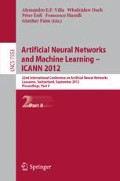Abstract
Joint approximate diagonalization (JAD) is a method solving blind source separation, which can extract non-Gaussian sources without any other prior knowledge. However, it is not robust when the sample size is small because JAD is based on an algebraic objective function. In this paper, a new robust objective function of JAD is derived by an information theoretic approach. It has been shown in previous works that the “true” probabilistic distribution of non-diagonal elements of approximately-diagonalized cumulant matrices in JAD is Gaussian with a fixed variance. Here, the distribution of the diagonal elements is also approximated as Gaussian where the variance is an adjustable parameter. Then, a new objective function is defined as the likelihood of the distribution. Numerical experiments verify that the new objective function is effective when the sample size is small.
Access this chapter
Tax calculation will be finalised at checkout
Purchases are for personal use only
Preview
Unable to display preview. Download preview PDF.
References
Amari, S., Cichocki, A.: A new learning algorithm for blind signal separation. In: Touretzky, D., Mozer, M., Hasselmo, M. (eds.) Advances in Neural Information Processing Systems 8, pp. 757–763. MIT Press, Cambridge (1996)
Cardoso, J.F.: High-order contrasts for independent component analysis. Neural Computation 11(1), 157–192 (1999)
Cardoso, J.F., Souloumiac, A.: Blind beamforming for non Gaussian signals. IEE Proceedings-F 140(6), 362–370 (1993)
Cichocki, A., Amari, S.: Adaptive Blind Signal and Image Processing: Learning Algorithms and Applications. Wiley (2002)
Hyvärinen, A., Karhunen, J., Oja, E.: Independent Component Analysis. Wiley (2001)
Lee, T.W., Girolami, M., Sejnowski, T.J.: Independent component analysis using an extended infomax algorithm for mixed subgaussian and supergaussian sources. Neural Computation 11(2), 417–441 (1999)
Matsuda, Y., Yamaguchi, K.: An adaptive threshold in joint approximate diagonalization by assuming exponentially distributed errors. Neurocomputing 74, 1994–2001 (2011)
Matsuda, Y., Yamaguchi, K.: An Information Theoretic Approach to Joint Approximate Diagonalization. In: Lu, B.-L., Zhang, L., Kwok, J. (eds.) ICONIP 2011, Part I. LNCS, vol. 7062, pp. 20–27. Springer, Heidelberg (2011)
Author information
Authors and Affiliations
Editor information
Editors and Affiliations
Rights and permissions
Copyright information
© 2012 Springer-Verlag Berlin Heidelberg
About this paper
Cite this paper
Matsuda, Y., Yamaguchi, K. (2012). A Robust Objective Function of Joint Approximate Diagonalization. In: Villa, A.E.P., Duch, W., Érdi, P., Masulli, F., Palm, G. (eds) Artificial Neural Networks and Machine Learning – ICANN 2012. ICANN 2012. Lecture Notes in Computer Science, vol 7553. Springer, Berlin, Heidelberg. https://doi.org/10.1007/978-3-642-33266-1_26
Download citation
DOI: https://doi.org/10.1007/978-3-642-33266-1_26
Publisher Name: Springer, Berlin, Heidelberg
Print ISBN: 978-3-642-33265-4
Online ISBN: 978-3-642-33266-1
eBook Packages: Computer ScienceComputer Science (R0)

